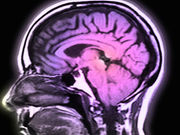Score also associated with worse memory, clinical progression in older adults
THURSDAY, July 7, 2016 (HealthDay News) — A genetic test may one day be able to predict the risk for Alzheimer’s disease (AD) in young adults, according to a study published online July 6 in Neurology.
Elizabeth C. Mormino, Ph.D., of Massachusetts General Hospital, and colleagues calculated a genetic risk score based on whether a person had several high-risk gene mutations. The participants, average age 75, included 166 people with dementia and more than 1,000 people without dementia. In addition, Mormino’s team looked for markers of AD, including cognitive decline, clinical progression, and the size of the hippocampus. They also looked at links between the risk score and hippocampus size in more than 1,300 healthy 18- to 35-year-olds.
The investigators found that among older people without dementia, a higher genetic risk score was associated with worse memory, clinical progression, and a smaller hippocampus. High scores were also associated with AD-like levels of β-amyloid burden as measured with florbetapir PET. Among the younger participants, a high risk score was linked to a smaller hippocampus.
“The influence of this genetic risk may begin in early life and make an individual more susceptible to cognitive impairment in late life,” the authors write. “Future refinement of polygenic risk scores may help identify individuals at risk for AD dementia.”
Several authors disclosed financial ties to pharmaceutical companies.
Copyright © 2016 HealthDay. All rights reserved.








